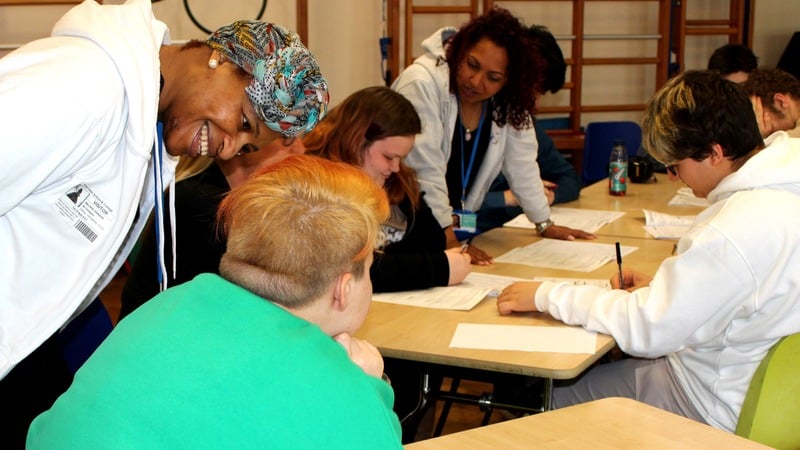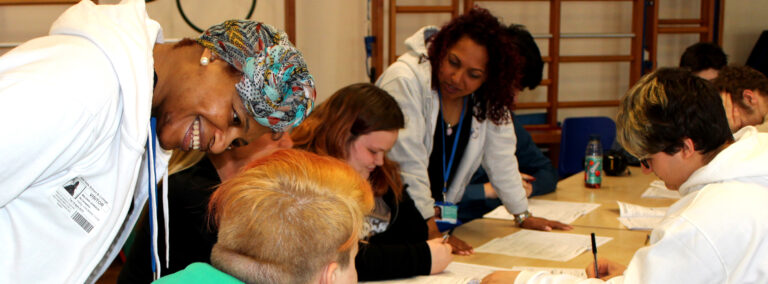Recently we met with Andre Skepple, Founder and CEO of FullSpektrum. We shared our observations on how we hear a lot about boys with autism or ADHD, who might be visibly restless or disruptive. But what about the SEN girls whose challenges often remain hidden? They might be quietly struggling, masking their difficulties, and falling through the cracks of a system that doesn’t fully understand their needs.
We questioned whether this oversight is having serious consequences, leaving these girls at risk of exclusion from school and falling behind academically and emotionally? Andre has produced a White paper for The Gifted, presenting the problems and unique challenges learners face, while introducing an innovative solution.
The Hidden Struggles of SEN Girls: Why They Often Go Unnoticed
In Andre’s paper, he invites us to think about the last time you saw a child or young person who appeared quietly withdrawn or frequently daydreaming. In many cases, this might be a young lady with ADHD or autism whose struggles aren’t immediately obvious. Females throughout their child and adolescent ages with these conditions often internalise their neuro-developmental challenges. They might mimic their peers or adopt a compliant attitude to avoid conflict. While this might help them navigate the classroom environment, it also means their difficulties can often go unnoticed and unaddressed, which inadvertently leads to prolific personal hurdles being faced throughout the many unique journeys across curriculum, employment and life experiences into and beyond adulthood.
For example, while boys with ADHD might display hyperactive and impulsive behaviour, girls may show signs like inattentiveness or quiet withdrawal. Similarly, autistic girls might mask their social difficulties or focus intensely on specific interests, which can lead to delays in diagnosis. Research from the National Autistic Society (NAS) reveals that girls with Autism Spectrum Conditions (ASC) are diagnosed two years later than boys on average, and some remain undiagnosed until adulthood (NAS, 2020).
What is behind the masks?
By the time these girls reach secondary school, the lack of early support becomes evident. They may experience anxiety, depression, and isolation, often being misunderstood as “difficult” or “problematic” rather than receiving the support they need.
Last year, The Gifted worked with several schools across the London Borough of Enfield, engaging with girls and young people who are at risk of exclusion. Often these students have multiple vulnerabilities. Very few had an EHC plan, the majority were from migrant communities and social emotional mental health issues, along with persistent disruptive behaviour were common place.
The level of engagement was high and our partner schools told us that attendance had improved on the days when The Butterfly Project was taking place. During our workshops we were able to glean valuable insights into what might be impacting their behaviour, self esteem and educational attainment. It is not always as clear cut as a special educational need assessment. Young people have shared their experience of micro aggression in their communities, racism, misogyny and bullying in school settings. They have also described personal experiences that resemble ‘parentification’ at home (or a being a young carer) and ‘adultification’ at school (particularly common among girls from black and ethnic minority backgrounds).
We understand how difficult it can be for schools to know who to prioritise for a SEN assessment while untangling all these different personal and social issues, especially when the wait list is so long and demand for support is so high. We noticed some parents would resist an assessment due to distrust or mis-information. There is often a misconception that schools and authorities need parental consent to start the assessment process or an EHC application. The parental response to special educational needs differs among various ethnic and cultural groups. This means some young people get supported, while others are spending their school years in survival mode.
Action Time
The Butterfly Project is a six week programme and it is a good place to start. We recognise that a deeper understanding of the social/ cultural complexities and a holistic approach is needed now more than ever before.
In terms of action, The Gifted is committed to supporting schools in building stronger parent engagement. Working with community experts that can provide strategies in connecting with migrant and ‘hard to reach’ families. As educators and community stakeholders we all need to be aware of our unconscious bias, so we are also working with agencies to provide training on cultural competencies within schools. We are producing a guide for parents to understand the SEN assessments and the legal framework in relation to EHC plans.
Behaviour management in schools is problematic when there is a need to balance a restorative, trauma informed approach with contextual safeguarding and cultural competence. In 2025, we will host a series of webinars to help us collectively navigate the challenges and achieve the best possible outcomes for vulnerable girls and young people.
Email info@thegifted.org.uk for a copy of FullSpektrum whitepaper.



